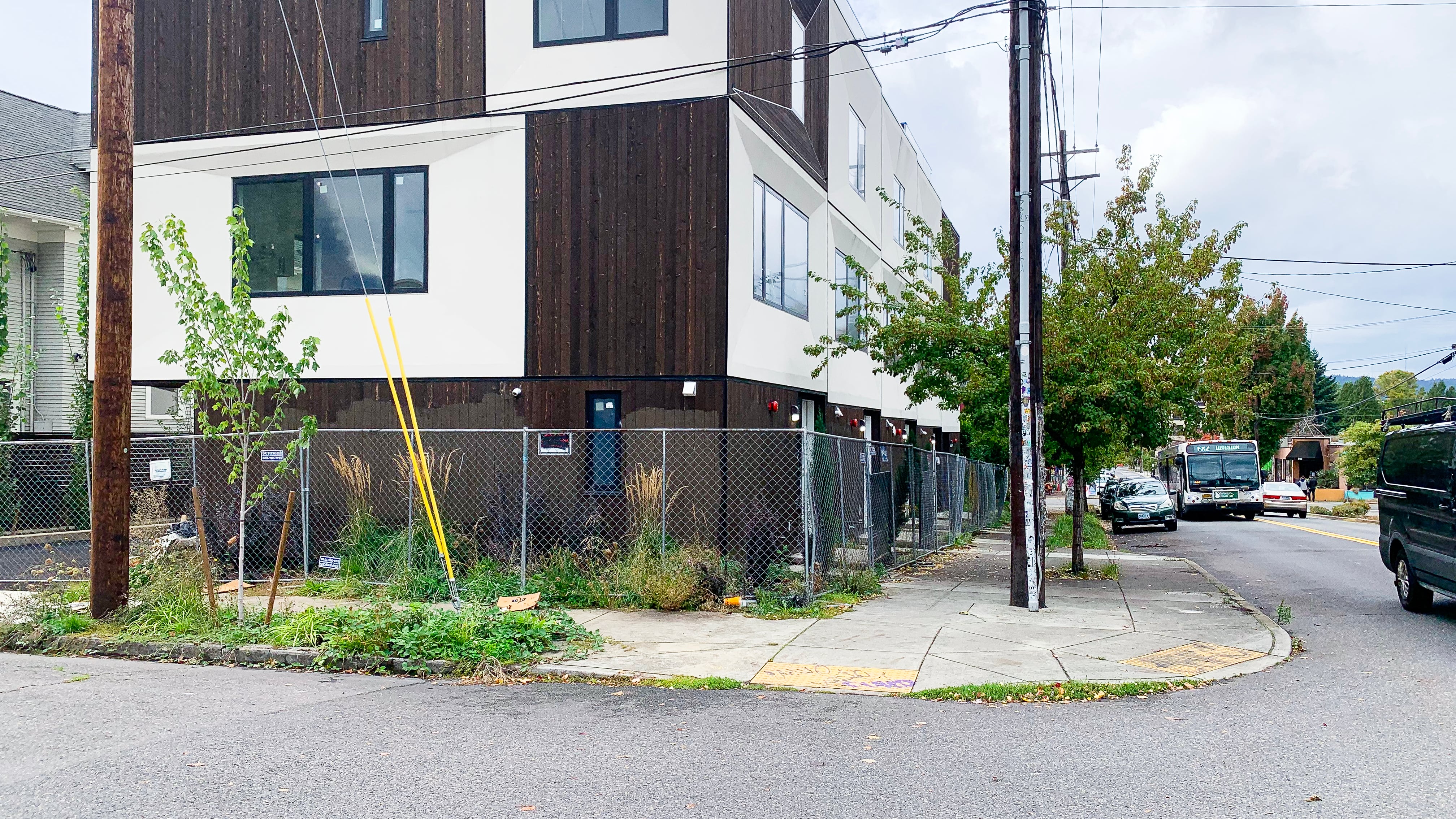ADDRESS: 2260-2276 SE Division St.
YEAR BUILT: 2020
SQUARE FOOTAGE: 7,500
MARKET VALUE: $2.8 million
OWNER: 2505 SE 23rd Avenue LLC
HOW LONG IT’S BEEN EMPTY: 3 years
WHY IT’S EMPTY: A lawsuit between developers
Lucas Ralston does not like to talk about the five uninhabited townhouses along Southeast Division Street at 23rd Avenue.
The townhomes are surrounded by a fence and occasionally tagged with graffiti. That’s despite being built less than three years ago and—aside from the spray-painted vulgarities—looking brand new.
All five are owned by a limited liability company whose principal, David Chiddix, is based in Santa Rosa, Calif. According to business records, Chiddix is vice president of Colorado Federal Building & Investment LLC, an investment and real estate company.
And that’s where California met Oregon in 2015 and everything went south, according to a bitter, six-year, ongoing lawsuit in Multnomah County Circuit Court between a prominent Portland development family and a longtime family friend.
A December 2018 lawsuit filed by MLR Investment, a development company led by longtime Portland developer Tim Ralston and his son, Lucas, lays out the rift.
The Ralstons’ company agreed in 2015 to develop 17 Oregon and Washington properties for Colorado Federal Building and Investment (that’s the company where Chiddix is vice president). They ranged from apartment complexes to single-family homes to townhouse complexes, including the Division townhomes that now lay fallow.
The Ralstons hired a longtime family friend named Ryan Zygar to manage the Oregon developments. (According to filings, Lucas Ralston, 33, lived in California at the time and Tim Ralston spent much of his time there.) The Ralstons provided Zygar with a car and space at their company’s Portland office, although they later said in court declarations he was unemployed and living with his parents. Filings claim the Ralstons agreed to pay Zygar a base salary of $1,000 a month per development until completion.
By 2017, things had gotten weird. The Ralstons allege in court filings that Zygar and his company, Tieton Homes, spent $844,000 “on impermissible, unrelated, and wrongful expenses including, but not limited to gas, groceries, office supplies, department stores, restaurants, and other miscellaneous personal expenses.”
The Ralstons are alleging fraud and unjust enrichment. (Zygar denies in court filings that he ever misused funds.)
It’s not clear from court documents who actually developed the homes, and Lucas Ralston wouldn’t say if it was his and his father’s company or another developer who ultimately built them. But when the Ralstons sued Zygar in 2018, the legal fight put a hitch in Chiddix’s developments, including the Division townhomes.
The lawsuit has dragged on for nearly six years. Earlier this year, MLR’s attorney, Nicholas Henderson, withdrew, citing a conflict of interest. Court filings from January state he’ll now serve as a witness should the case move to trial.
Chiddix, who lives in an 8,500-square-foot home in Santa Rosa with seven bedrooms and nine baths on 10 acres of farmland, did not respond to phone calls and texts seeking comment.
When reached by phone, Lucas Ralston asked: “What exactly are we talking about?” But he seemed acutely aware of the empty townhouses on Division. Ralston explained the company he runs with his father “developed them for a bank.” He later backtracked and said, “It wasn’t really our call not to develop them.”
“This is kind of a longer story,” Ralston told WW. “I’m going to have to go now, and good luck on your story.”
Zygar said he “had a dispute” with the Ralstons “and left.” He added: “I needed to move on, get away from them.”
If one were to look at the townhomes today, fence and graffiti aside, they look move-in ready. But according to city permitting documents, the owner is still pulling city permits for various interior work, such as expanding the fourth floors and installing glass guardrails on the decks.
WW’s original tipster on this property expressed a flash of optimism in their email.
“At least,” the tipster wrote, “they’ve recently been painting over the graffiti.”
Every week, WW examines one mysteriously vacant property in the city of Portland, explains why it’s empty, and considers what might arrive there next. Send addresses to newstips@wweek.com.
